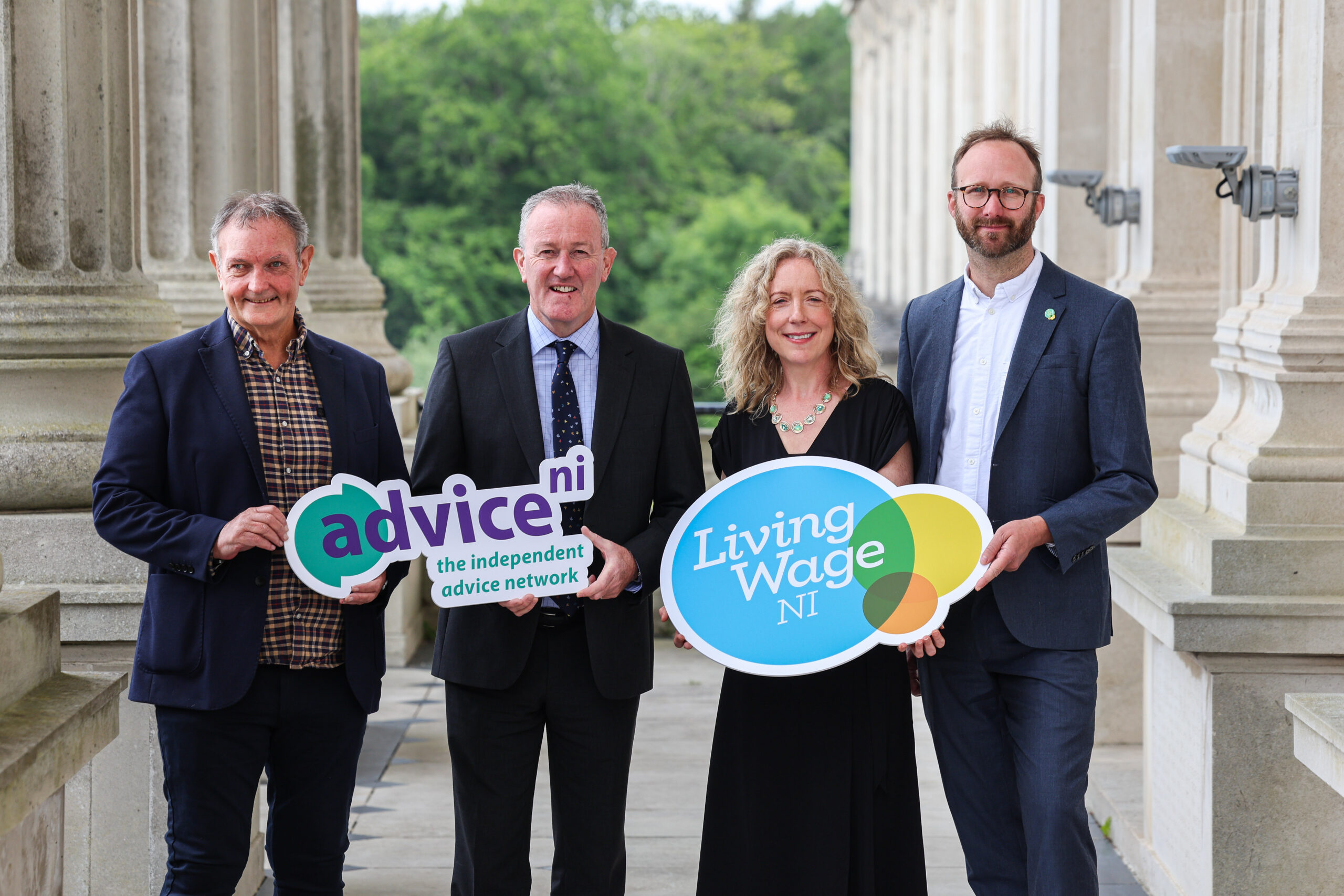Advice NI has launched Living Wage NI, an initiative aimed at increasing the Real Living Wage amongst employers across Northern Ireland. As the official regional partner for the Living Wage movement, Advice NI will advocate for fair wages and support employers in achieving the Living Wage accreditation.
Living Wage NI is supported by the Department for the Economy and will receive £125,000 funding per year to promote the programme. Its launch event took place at Parliament Buildings today attended by Economy Minister, Conor Murphy.
The Real Living Wage is the only UK wage rate based on the cost of living and considers factors such as housing costs, food prices, and utility expenses. It differs from the national living wage in that it is paid to all individuals aged 18 and above. Currently, the real living wage is £12.00 per hour across the UK and £13.15 in London.
According to The Annual Survey of Hours and Earnings (ASHE) provisional data for 2023 highlights that Northern Ireland has one of the highest rates of workers paid below the real living wage in the UK. Currently, 15.6 per cent of workers in Northern Ireland earn below the Real Living Wage, compared to 10.1 per cent in Scotland and 12.9 per cent in Wales.
It also reveals that Northern Ireland contains several Real Living Wage hotspots where one in five workers earn below this threshold and women are particularly affected, with 18 per cent earning less than the Real Living Wage, compared to 13.2 per cent of men.
The Living Wage movement began in London in 2001 and since then nearly 15,000 employers across the UK have become Living Wage employers, benefiting over 460,000 workers explains Bob Stronge, CEO of Advice NI. He said, “Whilst the Real Living Wage has been embraced across the wider UK, less than one percent of these employers are from Northern Ireland. We aim to change this by working in partnership with the Living Wage Foundation and the Department for the Economy.
Our mission is to drive awareness of the Real Living Wage and increase the number of accredited employers in Northern Ireland, signifying a commitment to paying all directly and indirectly employed staff a fair wage. Through our work, we know that people are struggling and offering the living wage is not only the right thing to do but will provide a crucial financial boost to those who need it most.”
Currently, only 97 organisations in Northern Ireland are Living Wage employers, compared to 3,714 in Scotland and 580 in Wales, underscoring the need for increased advocacy and support for the Living Wage movement across Northern Ireland.
Economy Minister Conor Murphy emphasised the importance of this initiative, stating, “There is compelling evidence, backed up by research, that paying workers the Living Wage increases productivity, and leads to better physical and mental health. Supporting this partnership between Advice NI and the Living Wage Foundation is an important part of a wider policy agenda to promote good jobs, one of my four economic priorities.
I am pleased to confirm that my Department will provide funding of £125,000 per year to raise awareness of the Living Wage and increase Living Wage Accreditation among employers here – a very sound investment in our economy and society. Everyone should be paid a wage that provides them and their family with a decent standard of living, and I look forward to continuing to work with Advice NI and the Living Wage Foundation in the time ahead with the aim of achieving this goal.”
Advice NI’s commitment to the Living Wage movement is longstanding. The organisation signed up as a Living Wage employer in 2021 and its 2022 policy manifesto called for the adoption of Community Wealth Building as a strategy to address poverty and climate change, advocating for all government departments to become Real Living Wage employers.
Living Wage NI Regional Manager Mary McManus, who has long been an advocate for the Real Living Wage, said, “The Living Wage enables workers to live decently and reduces the risk of financial difficulty. Businesses increasingly recognise that paying the real living wage is not only the right thing to do but also benefits their operations through improved recruitment, employee motivation, and productivity. It also has broader societal benefits by encouraging more businesses to join the movement.”
Graham Griffiths, Assistant Director at Living Wage Foundation adds, “We are thrilled to be partnering with Advice NI to launch Living Wage NI to tackle in-work poverty and encourage businesses to pay a real Living Wage based on the cost of living. With thanks to funding from the Department for the Economy, Living Wage NI will be able to build on the growing momentum, with recent accreditations including Queen’s University Belfast and Invest Northern Ireland, to secure pay rises for those who need them most.”
For more information about Living Wage NI and how to become a Living Wage accredited employer, visit www.adviceni.net or to find out more about the Living Wage Foundation visit livingwage.org.uk





